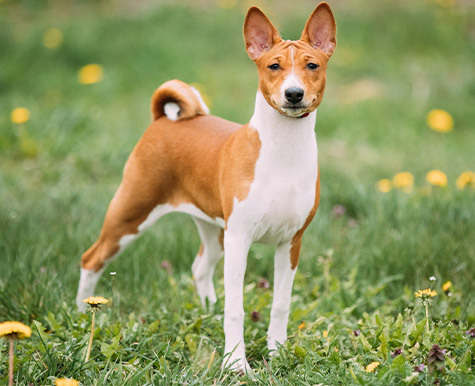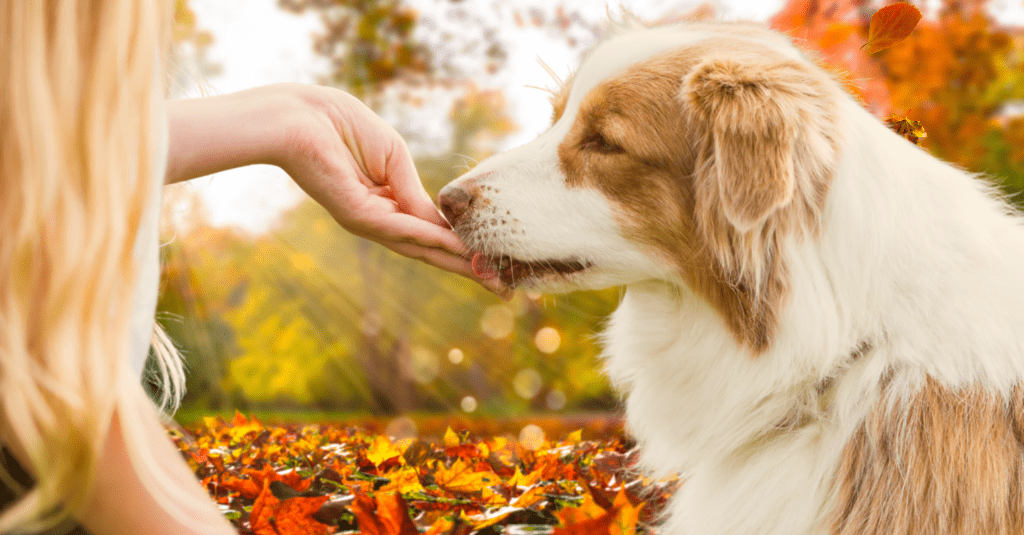






Basenji
 Overview
Overview
Overview of Basenji
A dog that doesn't bark? Yup - the Basenji may be barkless, but they are far from silent! They tend to yodel or “baroo” due to the unusual shape of their larynx. As arguably one of the oldest dogs in existence, depictions of Basenji-like dogs (tightly curled tails and pointy ears) can be found in ancient Egyptian, Babylonian and Mesopotamian art. The ancestors of the modern Basenji dog have lived alongside the Indigenous people of Central Africa for thousands of years as semi-wild hunting dogs. They prized Basenji puppies as versatile hunters with exceptional eyesight, speed, and a great sense of smell. Used for hunting lions, these medium-sized (20-24 lbs) dogs are known by the Azande and Mangbetu people as "the jumping up and down dog” to describe the way they leap up above the tall grass of the Congo plains. They were first brought over to the UK and the US in the 19th century and were nearly wiped out by Fanconi syndrome - a fatal genetic condition. Breeders travelled to Central Africa in the 1980s to bring back more Basenji pups to diversify the genetic pool and since then, there have been genetic tests created to help prevent the spread of this condition. The notoriety of the Basenji quickly grew when featured on the silver screen in the 1956 film Goodbye, My Lady - a story about a boy separated from his loyal companion (a Basenji). These unique pups come in black and white, black, tan and white, brindle and white or red and white with white paws, chest and tail tip. These dogs don't have the typical doggy smell because they are meticulous self groomers. Their short, low shedding coat is great for allergy sufferers and neat freaks alike!
Common Health Conditions & Recommendations for Basenji
Fanconi syndrome:
Is an inherited condition where the renal (kidney) tubules do not properly reabsorb water, electrolytes, vitamins and minerals back into the body. This causes the loss of too many fluids and nutrients which need to be replaced orally through supplementation. If caught early, symptoms can be managed and your Basenji can still maintain a good quality of life.
Recommendations for Fanconi syndrome in Basenji Dogs:
Common Health Conditions & Recommendations for Basenji
Progressive retinal atrophy in dogs:
Is characterized by progressive vision loss that may lead to blindness. The most common form of PRA in dogs is late-onset which may not develop until a pup is five years old.
Recommendations for Progressive retinal atrophy in dogs in Basenji Dogs:
Common Health Conditions & Recommendations for Basenji
Hypothyroidism in dogs:
Is a condition where there are not enough thyroid hormones produced. There are many areas of the body affected when the thyroid gland is underactive such as metabolism and appetite. Hypothyroidism is a common issue in many purebred dogs, including Basenjis.
Recommendations for Hypothyroidism in dogs in Basenji Dogs:
 Personality
Personality

Basenjis have existed alongside humans for thousands of years so, they still retain many wild traits, such as their high prey drive and independent mind (which shines when they need to solve problems!) Basenjis are among the most challenging breeds to train because of their high intelligence, so they can be stubborn and willful and are not recommended for first-time dog owners. If you already have a pet in the home and want to bring home a Basenji puppy, keep in mind that because of their high prey drive, they may not play nice with small animals (cats included). However, if socialized early, they can be affectionate and beautiful pets to welcome into your home. They also don't do well with other members of the breed, of the same gender. If you want to adopt two Basenjis, they would be the happiest as a male/female pair. Known to scale fences and escape if bored, you will want to keep your clever pup entertained with many toys and things to do around the house. They should not be trusted off-leash and, like Greyhounds, do not like the rain or cold. If you're looking for a smart, energetic companion who excels at dog sports, with an unmistakable wrinkled brow and coiled tail, then the Basenji could be the dog for you!



 USD
USD
 Canadian Dollars
Canadian Dollars


